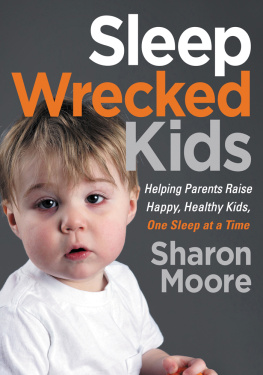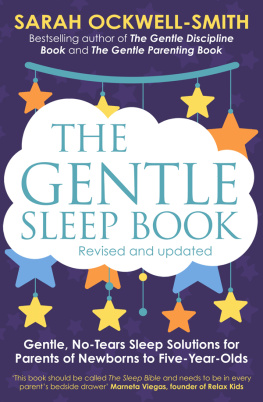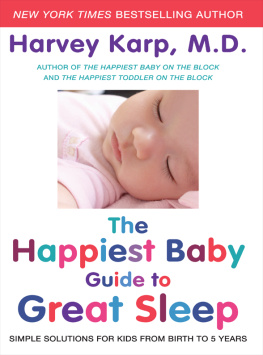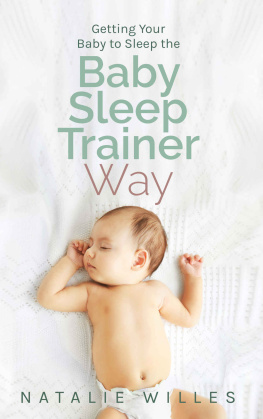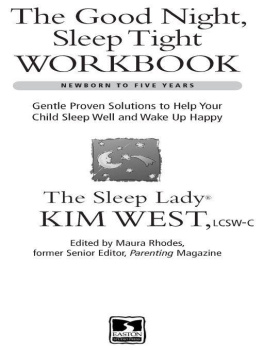Sleeping
Through
the Night
Revised Edition
How Infants, Toddlers, and
Their Parents Can Get
a Good Nights Sleep
Jodi A. Mindell, Ph.D.

To Scott and Caelie
Contents
PART ONE
The Basics of Sleep
CHAPTER 1
Help, My Baby Wont Sleep!: An Introduction to Sleep and Sleep Problems

Lisa and John are at their wits end. Every night it can take up to two hours to rock their fifteen-month-old son, Ethan, to sleep. He then wakes up at least twice during the night and needs to be rocked back to sleep. Lisa and John frequently fight about what they should do, and at this point they are both too tired to function.

The above scenario describes the situation commonly faced by the parents of infants and toddlers. In fact, this situation is so common that the first question veteran parents ask new parents right after Is it a boy or a girl? and What is her name? is Is she sleeping through the night? Study after study has shown that approximately 25 percent of all young children experience some type of sleep problem. Most of these problems are related to getting to sleep and sleeping through the night.
Sleep, or the lack thereof, is a critical aspect of child rearing. Good babies sleep. Most babies dont. As long as everyone gets enough sleep, parents can deal with just about anything during the day. However, when you are awake at 4:00 a.m. facing a screaming baby for the third time that night, all sanity goes out the window. It would try anybodys patience. And what parents resort to as a solution can be incredible: circling the block in their car at 3:30 a.m. wearing their pajamas with mismatched socks, their baby sleeping peacefully in the car seat, trying to imagine how they are going to explain the situation if pulled over by a police officer.
SLEEPWHAT IS IT?
Everyone sleeps. Humans sleep, toads sleep, monkeys sleep, dogs sleep, and whales sleep. But, surprisingly, we know very little about sleep. Although sleep researchers understand the mechanisms of sleep and what happens to the brain and body when we sleep, we still do not know why we sleep. Some believe sleep has a restorative function. Others believe that we sleep to conserve energy. Still others believe that sleep is adaptive, that it enhances survival. What we do know is that everyone needs to sleep. People cannot function without it. The body craves sleep when too much time has gone by without it. People also dont feel like themselves when they havent gotten enough sleep. So while we are not exactly sure what sleep is, we do know that we need it.
One aspect of sleep that is well understood is that many people have sleep disorders. Approximately 2530 percent of adults have a sleep problem, such as insomnia or obstructive sleep apnea, and most adults get too little sleep. Babies and toddlers have sleep problems too. Some are quite serious, such as sleep apnea. Most are just difficult to deal with, such as problems at bedtime or frequent night wakings.
Sleep is a natural process and we all know how to sleep. However, good sleeping habits need to be developed. Bad sleeping habits, especially when trying to fall asleep, are what become problematic for many babies and toddlers. Babies learn to fall asleep under specific circumstances, such as being rocked, being pushed in a stroller, or simply lying in a crib. It is these circumstances that may or may not lead to a babys sleep problems; that is, many babies develop good sleep habits, whereas other babies develop poor sleep habits. These issues will be addressed more thoroughly throughout this book.
WHY DOESNT MY BABY SLEEP?
Sleep problems in young children are much more common than you may think. While research studies have consistently shown that between 25 percent and 30 percent of all infants and toddlers have some type of sleep disturbance, a recent National Sleep Foundation Sleep in America poll found that almost seven out of ten children (up to age ten) experience some type of sleep problem, and 75 percent of all parents want to change something about their childs sleep. That is a large number of children and families. You are certainly not alone if you have problems with your babys sleep.
Of course, if your neighbors baby or your friends baby sleeps, then you may ask yourself, Why does my child have a problem? First of all, and most important, it seems there is a biological predisposition to having sleep problems. This means that some babies are more susceptible to sleep problems than others. Some babies start sleeping through the night within a few weeks of coming home from the hospital and never have any problems with sleep. Other babies, however, never seem to get a good nights sleep. Thus, some babies are born sleepers and some babies are not. Some babies have more difficulty learning to fall asleep, are more easily aroused from sleep, and are more sensitive to changes in routines that affect their sleep patterns. I once heard a parent joke that when she ordered her next baby, she was going to check the sleeper box. Many parents feel this way.
Some parents blame themselves for their childs sleep problems. Some believe that if they just hadnt rocked him to sleep as an infant, he would be fine. Others feel that they let their child sleep in bed with them for too long, and that is what caused their babys problems. Unfortunately, the truth is that parents often do play a role in their childs sleep problems. They may inadvertently have instituted poor sleep habits. But a babys sleep problems are not entirely the parents fault. The baby also contributes. Many babies who are rocked or nursed to sleep go to sleep quickly and dont wake during the night. It is apparent, then, that the same parenting behavior can lead to sleep problems in some babies and not in others. Parents therefore need to change their behavior only if their baby has a problem sleeping through the night.
PREDICTORS OF SLEEP PROBLEMS
In addition to a biological predisposition, there are certain other factors that place a child at risk for sleep problems. Below are a number of things that can contribute to a baby having a sleep problem.
F IRSTBORN . Firstborns are more at risk for sleep problems. Why? Probably because parents are more anxious with their first child. This is their first time at parenting, and they are usually more concerned about whether they are doing it right or wrong. They tend to be much less tolerant of their childs cries, and they have more time to devote to their first child, including getting up and rocking the baby back to sleep in the middle of the night. Later, when the family is larger, parents tend to set a definite bedtime for the children. When it is bedtime, everyone goes to bed. There are no ifs, ands, or buts about it. And it is rare to have the luxury of rocking later-born children to sleep or nursing them to sleep when you are trying to get everyone into pajamas with teeth brushed and so on.
C OLIC OR EAR INFECTIONS . Children with colic or frequent ear infections are much more likely to have sleep problems, primarily because they get into the habit of waking during the night when they arent feeling well. Then, even when they are feeling better, they may still wake during the night and have difficulty returning to sleep without help from their parents. For the parents, it is difficult to determine whether their baby is still in pain from an ear infection or is just having problems sleeping.
Next page

